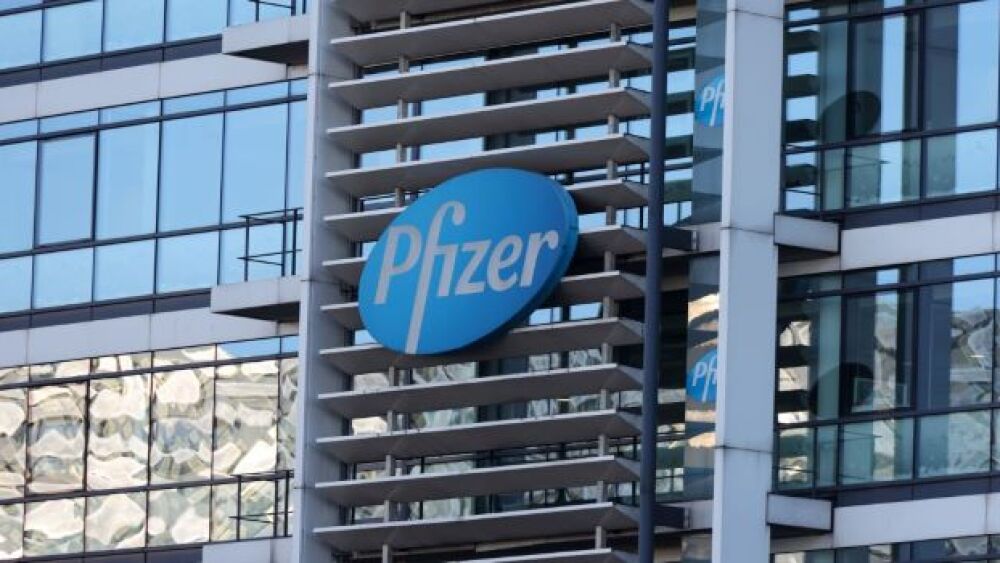Arena Pharmaceuticals’ share price nearly doubled in premarket trading after Pfizer announced it was acquiring the company and its diverse portfolio of developmental and clinical assets.
Pierre Suu/Getty Images
The share price of Arena Pharmaceuticals nearly doubled in premarket trading after pharma giant Pfizer announced it was acquiring the company and its diverse portfolio of developmental and clinical assets, including a late-stage ulcerative colitis treatment, in an all-cash deal valued at approximately $6.7 billion.
Pfizer will acquire outstanding shares of the company for $100 per share. Arena’s stock closed at $49.94 on Friday, and the share price has soared to $95.95 in premarket trading after the announcement was made.
Mike Gladstone, president and general manager of Pfizer’s Inflammation and Immunology division, said the acquisition of Arena would complement the company’s inflammation and immunology business. He said the Arena assets would provide hope for a better and more effective treatment for patients with debilitating immuno-inflammatory diseases.
Specifically, Pfizer is eying Utah-based Arena’s experimental Crohn’s treatment etrasimod, a highly selective, once-daily, oral sphingosine 1-phosphate (S1P) receptor modulator. Not only does etrasimod show potential in Crohn’s because of its design to provide systemic and local effects on specific immune cell types, but the experimental drug can also potentially treat multiple immune-mediated inflammatory diseases, including ulcerative colitis, eosinophilic esophagitis, atopic dermatitis, and alopecia areata.
Currently, etrasimod is in two Phase III studies in ulcerative colitis, a Crohn’s disease study, and is moving into a late-stage program in atopic dermatitis.
In Phase II studies in ulcerative colitis, etrasimod showed promise. After 12 weeks, many patients showed positive clinical responses, clinical remission, or endoscopic improvement. Additionally, data showed that patients in the study experienced sustained or improved effects up to week 46 an open-label extension. Etrasimod also demonstrated a favorable benefit/risk profile. Data from the Phase III studies are expected in 2022.
Last month, Arena announced it achieved target enrollment in its Phase II/III CULTIVATE Study A, designed to assess the efficacy, safety, and tolerability of oral etrasimod as a potential therapy for adult participants who have moderate to severe Crohn’s disease and are refractory or intolerant to at least one of the currently available therapies. Etrasimod is also in two Phase II programs in eosinophilic esophagitis and alopecia areata.
“Utilizing Pfizer’s leading research and global development capabilities, we plan to accelerate the clinical development of etrasimod for patients with immuno-inflammatory diseases,” Gladstone said in a statement.
In addition to etrasimod, Arena’s pipeline includes two development-stage cardiovascular assets, temanogrel and APD418. Temanogrel is currently in Phase II development to treat microvascular obstruction and Raynaud’s phenomenon secondary to systemic sclerosis. APD418 is currently in a Phase II clinical trial for acute heart failure.
Arena President and Chief Executive Officer Amit D. Munshi expressed excitement regarding the planned acquisition. Munshi said the proposal recognizes Arena’s potentially best-in-class S1P molecule and contribution to addressing unmet needs in immune-mediated inflammatory diseases. When the merger goes through, Munshi said Pfizer’s capabilities will accelerate the company’s mission to bring those medications through the regulatory paths and to patients who need new options.
“We believe this transaction represents the best next step for both patients and shareholders,” Munshi said in a statement.
Featured Jobs on BioSpace





